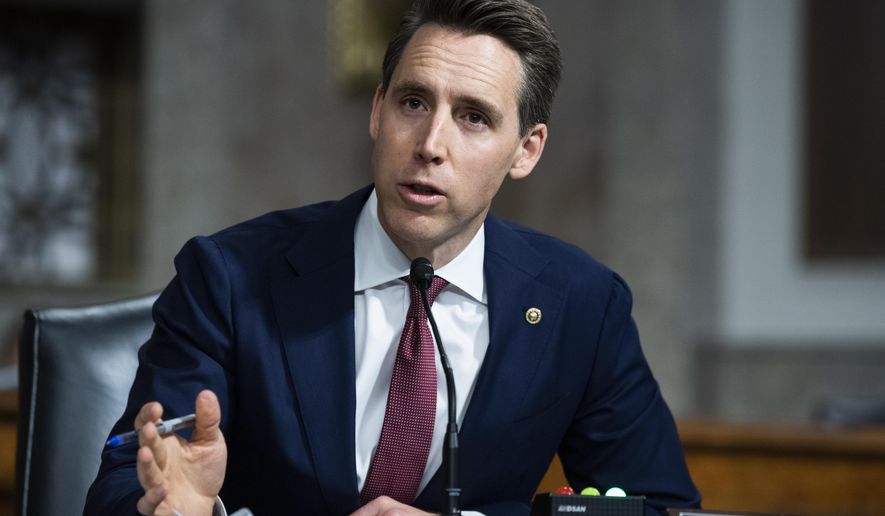Sen. Josh Hawley wants Arkansas’ and Utah’s new laws limiting children’s social media usage to create momentum for nationwide rules to reduce digital danger for those younger than 16.
The governors of Arkansas and Utah have signed legislation restricting children’s social media usage that requires age verification and parental consent. Utah also has set a curfew for young users of the platforms.
Mr. Hawley, Missouri Republican, said Wednesday that he is glad states are “waking up” to social media’s effect on children. He said the federal government now must take more aggressive steps.
“We need comprehensive action at the federal level to make a meaningful difference,” Mr. Hawley said in a statement. “Let’s start by studying the harms of social media on kids, prohibiting social media companies from offering accounts to users under age 16, and giving parents the ability to sue Big Tech for the bodily or mental harms their products cause.”
Arkansas Gov. Sarah Huckabee Sanders, a Republican, signed the Social Media Safety Act into law last week. She said the law made her state a national leader in protecting children.
“As a parent, this is a very personal thing,” Ms. Sanders said at a press conference. “I have a 10-year-old, a 9-year-old and a 7-year-old, and seen the increase that we have not just here in Arkansas but across the country when it comes to things like depression, anxiety, loneliness, suicide rates, particularly among teenage girls.”
Arkansas’ law bars social media companies from providing accounts to users younger than 18 without parental consent and age verification. It directs social media companies to use third-party vendors to determine children’s ages. The vendors are responsible for checking government identification for the children, such as driver’s licenses.
The state law may exempt some technology products that are popular with children, such as the Google-owned video platform YouTube. The law says media companies that offer subscription content where the primary purpose is not social interaction are not subject to the restrictions.
The Computer & Communications Industry Association, a nonprofit whose members include Amazon, Apple, Meta and Google, opposes the state restrictions.
The association’s state policy director, Khara Boender, said her team favors other solutions, such as tech safety agreements proposed by North Carolina Attorney General Josh Stein, designed to get parents and their children to talk about online safety.
Meta spokesperson Rachel Holland declined to answer questions about Arkansas’ and Utah’s laws or the federal proposals.
Ms. Holland said Meta, the parent company of Facebook and Instagram, cares about teenagers’ safety and plans to continue working with parents and policymakers to address issues involving children.
“We’ve developed more than 30 tools to support teens and families, including tools that let parents and teens work together to limit the amount of time teens spend on Instagram, and age verification technology that helps teens have age-appropriate experiences,” Ms. Holland said in a statement. “We automatically set teens’ accounts to private when they join Instagram, and we send notifications encouraging them to take regular breaks.”
Utah’s social media rules require tech companies to set curfews from 10:30 p.m. to 6:30 a.m. for users younger than 18.
Critics say the restrictions are reminiscent of communist China, which in 2021 started forcing companies to limit children’s access to video games to three hours per week. China required companies to use a registration system with real names to allow Chinese regulators to enforce the limit.
Enforcement of Utah’s curfew does not begin until March 2024. The state law also creates a private right of action for residents, making it easier to sue platforms that fail to comply with the requirements next year.
Utah Gov. Spencer Cox, a Republican, signed a pair of social media laws in March. The same day, TikTok CEO Shou Zi Chew testified before Congress to dissuade federal lawmakers from pursuing a nationwide ban on his platform.
Mr. Hawley supports banning TikTok, and his efforts to restrict the China-founded app have garnered more support from fellow lawmakers than his legislation limiting children’s exposure to social media.
He helped push a bill through the Senate last year to remove TikTok from government devices. President Biden signed it into law in December. Sen. Rand Paul, Kentucky Republican, blocked his proposed nationwide ban on TikTok last month.
Mr. Hawley’s Making Age-Verification Technology Uniform, Robust and Effective (MATURE) Act requiring platforms to verify that users are 16 or older is one of several proposals for national regulation of children’s online use.
Sen. Lindsey Graham, South Carolina Republican, said earlier this year that he was working with Sen. Elizabeth Warren, Massachusetts Democrat, on a bill to protect youngsters from sexual exploitation online.
Sens. Richard Blumenthal, Connecticut Democrat, and Marsha Blackburn, Tennessee Republican, have worked on children’s online safety legislation.
States might act sooner. Louisiana lawmakers on Wednesday revised the Secure Online Child Interaction and Age Limitation Act, which would create restrictions resembling Utah’s.
Lawmakers in New Jersey, Ohio and Texas are pushing similar proposals, and a Wisconsin state lawmaker has said on Facebook that he wants rules for how social media companies engage users younger than 18.
• Ryan Lovelace can be reached at rlovelace@washingtontimes.com.




Please read our comment policy before commenting.